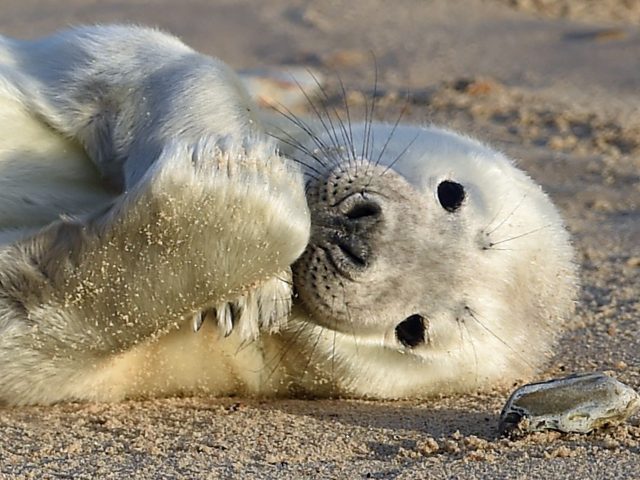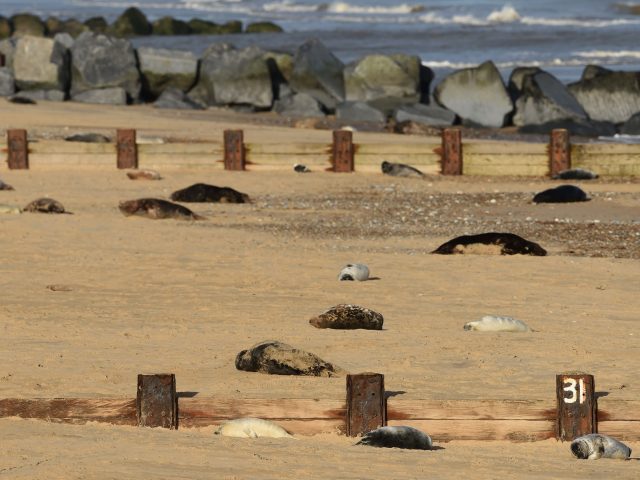
It has been a record-breaking year for the number of grey seal pups born around the east coast of Britain.
New record totals have been recorded at sites including Horsey and Blakeney Point in Norfolk, and at Donna Nook nature reserve in Lincolnshire.
By contrast, seal pup populations on the west coast were badly hit by former Hurricane Ophelia in October.
A number of seal pup deaths were recorded off Pembrokeshire, and also at the Isle of Man.
However, at many sites around the east coast, numbers continue to swell year on year.
 A grey seal pup on the beach at Horsey Gap (Joe Giddens/PA)
A grey seal pup on the beach at Horsey Gap (Joe Giddens/PA)
At Horsey, near Great Yarmouth, a new record of 1,643 grey seal pups has been recorded, topping 2016’s record of 1,500.
Volunteers from Friends of Horsey Seals completed the latest count on the beach on Thursday morning.
Peter Ansell, the group’s chairman, said that he expected record numbers to continue each year “until a natural disaster”, or disease or dwindling fish stocks affected the seals.
He said the increase was “a bit like compound interest”, with female seal pups maturing, returning to the beach aged four or five once in season to mate, then a year later to give birth.
Numbers were also up at Blakeney Point on the north Norfolk coast, with 2,598 pups counted on Monday – exceeding the previous record from 2014.
 Grey seals on the beach at Horsey Gap (Joe Giddens/PA)
Grey seals on the beach at Horsey Gap (Joe Giddens/PA)
Stephen Prowse, lead ranger for the National Trust on the Norfolk coast, said good population survival rates in previous years and previous breeding seasons were the likely cause of the increase.
The most recent count at Donna Nook nature reserve in Lincolnshire put the tally at 1,984 grey seal pups born – more than the 1,957 counted last year.
Lincolnshire Wildlife Trust, which manages the reserve, said year-on-year numbers had increased rapidly in the past, but had started to level off in recent years.
By contrast, numbers at Horsey continue to increase at a more rapid rate, though the reason for these differing rates is not known.
The pupping season is expected to finish in January, when final numbers will be known.


Why are you making commenting on The Herald only available to subscribers?
It should have been a safe space for informed debate, somewhere for readers to discuss issues around the biggest stories of the day, but all too often the below the line comments on most websites have become bogged down by off-topic discussions and abuse.
heraldscotland.com is tackling this problem by allowing only subscribers to comment.
We are doing this to improve the experience for our loyal readers and we believe it will reduce the ability of trolls and troublemakers, who occasionally find their way onto our site, to abuse our journalists and readers. We also hope it will help the comments section fulfil its promise as a part of Scotland's conversation with itself.
We are lucky at The Herald. We are read by an informed, educated readership who can add their knowledge and insights to our stories.
That is invaluable.
We are making the subscriber-only change to support our valued readers, who tell us they don't want the site cluttered up with irrelevant comments, untruths and abuse.
In the past, the journalist’s job was to collect and distribute information to the audience. Technology means that readers can shape a discussion. We look forward to hearing from you on heraldscotland.com
Comments & Moderation
Readers’ comments: You are personally liable for the content of any comments you upload to this website, so please act responsibly. We do not pre-moderate or monitor readers’ comments appearing on our websites, but we do post-moderate in response to complaints we receive or otherwise when a potential problem comes to our attention. You can make a complaint by using the ‘report this post’ link . We may then apply our discretion under the user terms to amend or delete comments.
Post moderation is undertaken full-time 9am-6pm on weekdays, and on a part-time basis outwith those hours.
Read the rules here